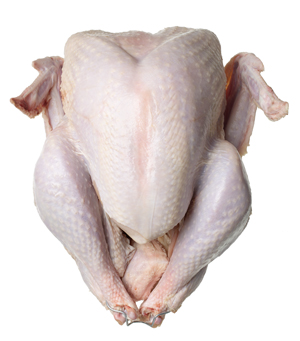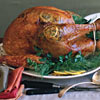
Last week I roasted my first turkey. And it nearly made me faint.
As part of of Bon Appetit's Project Recipe, I was asked to cook their Top 100 Roast Turkey—a full week before Thanksgiving—so it could appear on the blog as inspiration for other home cooks. Most people take their maiden turkey voyage surrounded by friends and family. But no one wants to eat turkey a week early. So it was just me and the bird. And I'll be honest: I'm never thrilled about working with raw poultry.

The recipe, an Herb and Mustard Turkey with Green Onion Gravy, asked me to rub butter between the skin and the meat of the bird. I was told to—"starting at the neck"—loosen the skin so I could slide my hands in. As someone who also has skin, I figured that would be hard to do. I was correct. First of all, I couldn't really find the neck skin. It appeared to be sealed. As I continued to spin the turkey in the roasting pan, trying to determine a course of action, I realized it was stuffed back inside the cavity. I would need to pry, massage, and untuck. I felt momentarily sick.
I recognize that I'm squeamish. Just a tiny bit. And I have been able to prepare many different kinds of meat for Project Recipe. But occasionally the "flesh factor" overwhelms me. For example, using my hand to determine the "doneness" of steak can make me so aware that I am grilling mammal that I temporarily consider not eating it.
Turkey gives me a special kind of ew-gross-ick feeling. 1) They are undeniably no longer-living birds. There are always a few stray feathers attached. 2) If, like me, you are a very pale person, you recognize the flesh. There is a reason the term "goose pimples" exists. Your arm can, in the right circumstances, look like a plucked goose. 3) Minus the head/neck area, turkeys are whole, so we cannot ignore that we are going to eat what was once running around, eating bugs, and getting pardoned by Sarah Palin.
I've made peace with the fact that I regularly eat carnitas—which once belonged to a pig that had no plans on being in a burrito. But preparing turkey calls to mind the abject.
The abject is a term that originated in the work of Bulgarian-born, French modern critical theorist Julia Kristeva. It is a sense of horror, or of breaking down of meaning, that occurs when we face something that defies our symbolic order. Something that is neither subject nor object. Something like a corpse. Now to quote the mighty Wikipedia, "To confront a corpse of one that we recognize as human, something that should be alive but isn't, is to confront the reality that we are capable of existing in the same state, our own mortality. This repulsion from death, excrement, and rot constitutes the subject as a living being in the symbolic order."
Ah yes. Nothing says Thanksgiving like death and rot.
But there's also no better time to remember that life is short. That we, like our Whole Foods special turkey, don't know what's coming. Growing up, and having any kind of rite of passage worth blogging about, includes facing our own, and our loved ones', and our dinner's mortality. Holidays, family, recession, change of season—this is a time to value life for what it is and embrace what you have.
So I put the herbs inside the turkey's cavity, rubbed it with the two tablespoons of olive oil, and put it in the oven. I hoped that they turkey's days in the sun had been as joyous as they possibly could have been. Then I rinsed its organs and put them in a stockpot. I didn't even flinch.
 Most popular pages on bonappetit.com:
Most popular pages on bonappetit.com:
Top 20 Thanksgiving Menus
Best Turkey Recipes
Thanksgiving Desserts Slideshow
Thanksgiving Sides Slideshow